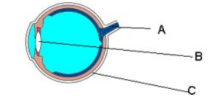Coordination and Control Quiz
Test your knowledge of the Coordination and Control, as part of GCSE Biology with this quiz.
This quiz consists of 15 questions, including multiple-choice and short-answer questions on the topic of Coordination and Control for GCSE Biology.
For multiple-choice questions, choose the correct answer. You can click on the images to expand the picture. Scroll down to begin the quiz.
Questions
What is homeostasis?
Incorrect
Incorrect
Incorrect
Correct
Which part of the nervous system carries signals from receptors to the central nervous system (CNS)?
Incorrect
Correct
Incorrect
Incorrect
Which gland produces insulin to regulate blood sugar levels?
Correct
Incorrect
Incorrect
Incorrect
What is the function of auxins in plants?
Incorrect
Incorrect
Correct
Incorrect
Which hormone is used in some contraceptive pills to prevent ovulation?
Correct
Incorrect
Incorrect
Incorrect
What is negative feedback and why is it important in homeostasis?
Negative feedback is a process that counteracts changes in the body to maintain a stable internal environment. It is important because it helps regulate conditions such as temperature, blood glucose, and water balance.
Name two differences between the nervous system and the endocrine system.
The nervous system uses electrical impulses, whereas the endocrine system uses chemical signals (hormones).
The nervous system acts quickly and for short durations, whereas the endocrine system has slower but longer-lasting effects.
How does the body respond to an increase in blood sugar levels?
The pancreas releases insulin, which helps cells absorb glucose and stimulates the liver to store glucose as glycogen, reducing blood sugar levels.
What are two ways the body loses water?
Through sweating
Through urine production in the kidneys
What is the role of FSH (follicle-stimulating hormone) in the menstrual cycle?
FSH stimulates the growth of eggs in the ovaries and triggers the production of oestrogen.
How does IVF (in vitro fertilisation) help couples with infertility?
IVF involves fertilising an egg outside the body and implanting it into the uterus, helping couples who struggle to conceive naturally.
What is phototropism and how does it benefit plants?
Phototropism is a plant’s growth response to light, where shoots grow towards light to maximise photosynthesis.
Why is ADH (antidiuretic hormone) important in water balance?
ADH regulates water reabsorption in the kidneys, ensuring the body retains or releases the right amount of water to maintain balance.

